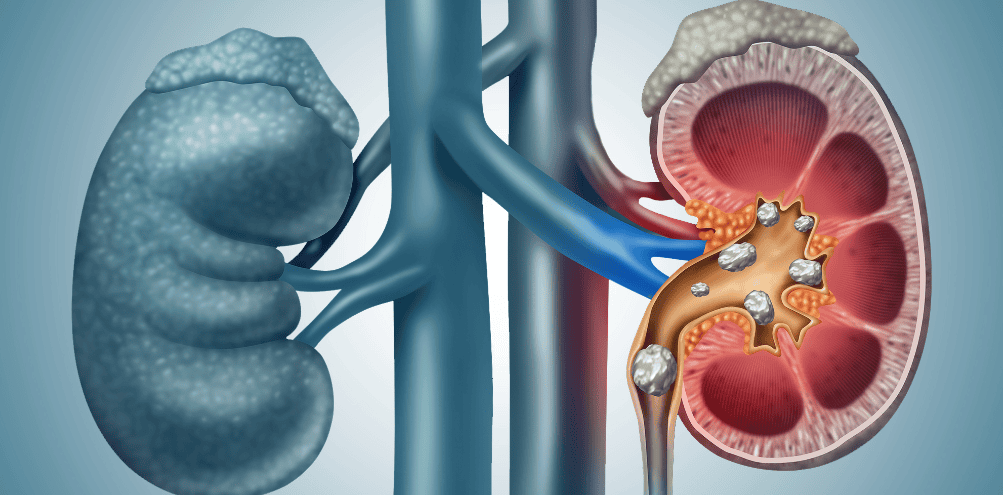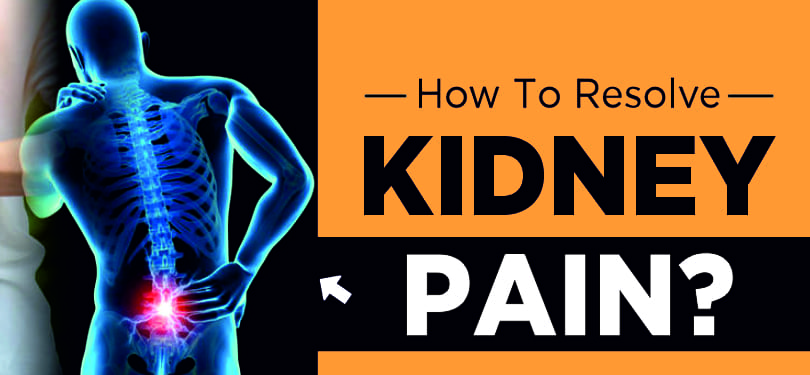What Are Kidney Stones?
Kidney stones are hard pebble-like particles that can develop within your kidneys. Kidney stones are usually found to be made up of minerals and salts. It is easy to identify kidney stone symptoms. Kidney stone pain is known for its intensity. The pain is severe and sharp. Kidney stone pain area can be identified easily as it is observed at the sides and back, below the ribs. Pain radiates to the lower abdomen and groin. It comes in waves and fluctuates in intensity. Pain or burning sensation while urination is also observed.
Kidney stones are different from bile stones. Doctors refer the kidney stones as renal calculi, nephrolithiasis, or urolithiasis.

Kidney Stone Causes
Kidney stones are formed when the urine has a high quantity of minerals and other chemicals like calcium, oxalate, and uric acid, which combine to form crystals. A few crystals combine to form one or more stones.
Kidney stones size varies from the size of a kernel of corn to a grain of salt or might grow bigger. These are formed when your body has excess of certain minerals and lacks enough hydration. The stones can be smooth or rough, brown or yellow.
A kidney stone can be of small size. A larger one, on the other hand, can obstruct your urine flow and cause severe pain. If the stone obstructs the urinary pathway, people might require Kidney Stone Surgery. Small stones can be easily treated with Ayurvedic Kidney Stone Medicines.
People have compared the stone pain is worse than labor pain. Ayurvedic Kidney Treatment has been found beneficial in providing Kidney Stone pain relief and reducing the chances of recurrence.
Kidney stones can be due to various factors like what you eat and effect of medications etc. You are more prone to get kidney stones, if you have a family history of kidney stones.

Kidney Stone Types
The stones are formed of various components. It is important to understand the type of stone to figure out what caused it and how to avoid it. You must assess the kind of kidney stones so that they can be used to identify the treatment.
Calcium deposits
The large part of kidney stones is made up of calcium oxalate. Calcium stones are of two types:
Oxalate of calcium. Oxalate is a chemical that your liver produces daily. It is also abundant in some fruits and vegetables, as well as nuts and chocolates. Taking large amounts of vitamin D, intestinal bypass surgery, and certain metabolic conditions can all cause an increase in the concentration of calcium or oxalate in your urine.
Calcium phosphate is a mineral. This type of stone formation is more frequently seen in persons with metabolic problems such as renal tubular acidosis or those who take medicines for migraines or seizures.
Struvite crystals
These crystals are formed due to urinary tract infection (UTI). The bacteria that causes infection produces ammonia in your urine and further produces stones. The stones grow in size very rapidly.
Stones are made of uric acid. These develop in persons with chronic diarrhea or malabsorption, who eat a high-purine diet, or who have diabetes or metabolic syndrome. A genetic history may also raise your chances of developing uric acid stones.
Stones of Cystine
This is an uncommon type of stone. It occurs when the kidneys excrete an excessive amount of a specific amino acid called cysteine into the urine. It is observed in patients with a hereditary condition called cystinuria.
Factors responsible for Kidney Stones
Kidney stones may not always have a single cause, and a number of variables can raise your chances of acquiring them. Some of these elements are detailed below. They are as follows:
Lack of water
The color of urine should be transparent or pale yellow. Not drinking enough water or sweating excessively increases the probability of stone formation. The citrate in lemon or orange juice can block stone formation.
Diet
Eating habits can have a significant impact on development of kidney stones. Calcium and oxalate clump together during the process of urine production and form a kidney stone. Oxalates are found in large number of foods. If you’ve had this type of stone in the past, your doctor might advise you to reduce meals high in oxalate.

Gut problems
Sodium This is primarily obtained through table salt. It may increase your risk of developing certain kidney stones. Therefore, it is advised to avoid processed foods, canned foods, packaged meats, and salty snacks.

Animal-based protein When your urine is overly acidic, one type of kidney stone might develop. It occurs by eating red meat and seafood. This can build up in the joints and result in gout or travel to the kidneys and form kidney stones. More crucially, animal protein increases the calcium content and decreases the citrate content of your urine, both promoting stone formation.

In persons with inflammatory bowel diseases like Crohn’s disease and ulcerative colitis, stones are the most frequent kidney issue. You may get diarrhoea due to bowel issues, which reduces your urine production. More oxalate may be absorbed by the body from the gut, resulting in more urine.
Obesity
Obesity increases your risk of kidney stones, if your body mass index is 30 or more.

Additional medical issues
One or more types of kidney stones might develop as a result of a variety of illnesses.
Specific genetic illnesses Medullary sponge kidney is one instance of a congenital abnormality that results in kidney cyst formation.
Diabetes type 2 It may increase the acidity of your urine, favouring the formation of stones.
Ayurveda has been found beneficial in dealing with Kidney Stones and also reduces the chances of recurrence. Karma Ayurveda can help you deal with your kidney problems effectively.

